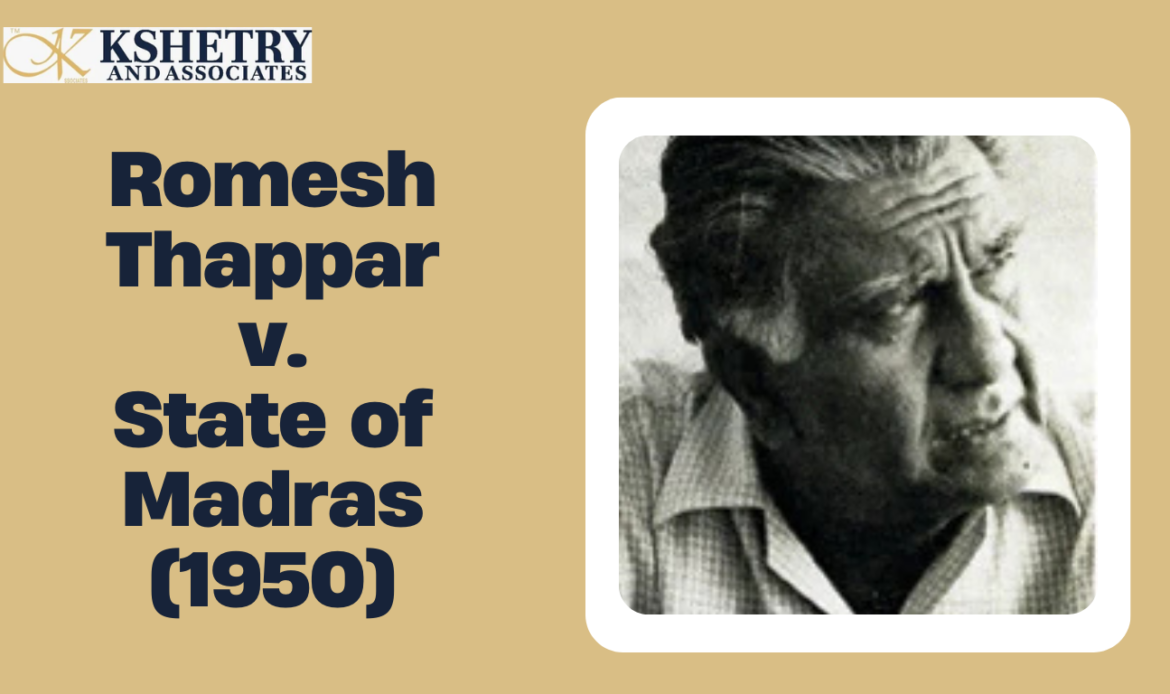The Supreme Court case Romesh Thappar vs State of Madras (1950) is a seminal judgment in Indian legal history, especially concerning the right to freedom of speech and expression. This case challenged the limits of state power over dissenting media and set a foundational precedent for the interpretation of free speech under Article 19(1)(a) of the Indian Constitution. The decision not only struck down the restrictive Section 9(1-A) of the Madras Maintenance of Public Order Act, 1949, but also became instrumental in prompting the First Amendment to the Constitution of India.
Background of the Case
In post-independence India, the political climate was marked by rising debates and dissent, which extended to the press. Cross Roads, a weekly journal published by Romesh Thappar, was critical of certain state policies and ideas, challenging the socio-political dynamics of the time. The Madras government, led by apprehensions over political dissent, imposed a ban on the circulation of Cross Roads within the state under Section 9(1-A) of the Madras Maintenance of Public Order Act, 1949. This section allowed the government to restrict publications if it believed such actions could “undermine the security of the state.”
Thappar, contending that the ban was a violation of his right to free speech under Article 19(1)(a) of the Constitution, moved the Supreme Court directly under Article 32, which guarantees the right to constitutional remedies.
Key Legal Issues
The Romesh Thappar case presented two fundamental questions for the Supreme Court to address:
- Does the government have the power to restrict media solely for presenting dissenting opinions or critiques of state policies?
- Is “public safety” a justifiable ground for limiting free speech under Article 19(2) of the Constitution?
The Supreme Court’s Ruling
The Supreme Court’s judgment in Romesh Thappar v. State of Madras was delivered by a bench headed by Chief Justice Harilal J. Kania. The Court ruled that the government’s restriction of Cross Roads was unconstitutional and invalidated Section 9(1-A) of the Madras Maintenance of Public Order Act, 1949.
Key Observations by the Court
1. Freedom of Speech as a Fundamental Right
The Court emphasized that Article 19(1)(a), which guarantees freedom of speech and expression, is a cornerstone of democratic society and integral to the functioning of democracy. Curbing this freedom threatens the very foundation of a democratic state.
2. Public Safety vs. Public Order
The Madras government had justified its actions under the grounds of “public safety.” However, the Court ruled that “public safety” was not specifically mentioned as a ground for restricting free speech under Article 19(2) of the Constitution, which allowed for reasonable restrictions only in the interests of “security of the state” or “friendly relations with foreign states.” The Court held that “public order” and “public safety” were broader than the narrowly defined “security of the state.”
3. Striking Down Section 9(1-A)
The Supreme Court concluded that Section 9(1-A) of the Madras Maintenance of Public Order Act exceeded constitutional limits by restricting the freedom of speech based on public safety, a ground not explicitly mentioned in Article 19(2). Consequently, the section was declared unconstitutional.
The First Amendment and Its Impact
The Romesh Thappar case, along with the contemporaneous Brij Bhushan v. State of Delhi case (in which the Court struck down pre-censorship of newspapers), prompted the government to reassess Article 19(2) to clarify the grounds for restricting free speech.
In response, the First Amendment to the Constitution of India was introduced in 1951. The amendment added “public order” as an additional ground under Article 19(2) to justify reasonable restrictions on free speech, thereby allowing the state to restrict expressions that could incite disorder or violence without compromising the broader right to dissent.
Significance of Romesh Thappar v. State of Madras
The Romesh Thappar judgment is significant for several reasons:
- Affirming Press Freedom: The judgment underscored the importance of a free press in a democracy and the role of the judiciary in upholding civil liberties against unwarranted state interference.
- Interpretation of Article 19(1)(a): The case led to a deeper understanding of Article 19(1)(a) and the permissible grounds for restrictions under Article 19(2). By clarifying that restrictions should be narrow and specific, the Supreme Court set a high threshold for limiting fundamental rights.
- Prompting Constitutional Amendment: This judgment directly influenced the First Amendment, a crucial development in Indian constitutional history. By adding “public order” to Article 19(2), the amendment aimed to strike a balance between the right to free speech and the need to maintain order and security.
- Setting a Precedent for Dissent and Democracy: The case affirmed that dissenting opinions should be protected, and any attempts by the government to curb free speech would be subject to strict judicial scrutiny. This principle has since guided numerous cases related to freedom of expression.
Conclusion
Romesh Thappar vs State of Madras remains a landmark decision that reinforced the protection of freedom of speech in India. The judgment not only upheld the importance of dissenting voices in a democracy but also contributed to shaping the First Amendment, which clarified the grounds for limiting free speech. This case set a critical precedent for safeguarding press freedom and civil liberties, solidifying the judiciary’s role as a protector of democratic values.
For expert guidance on constitutional law or civil liberties cases, Kshetry and Associates offer specialized services with deep knowledge of the judicial system. Our team is committed to ensuring that your rights are protected, whether in matters of free speech, public order, or other fundamental rights.

